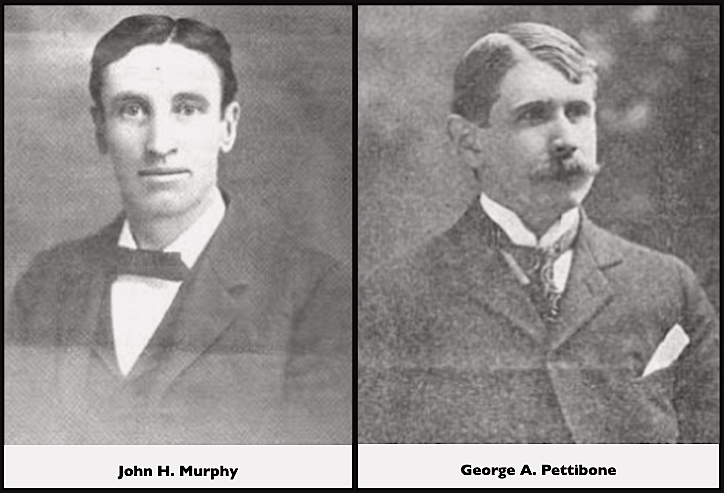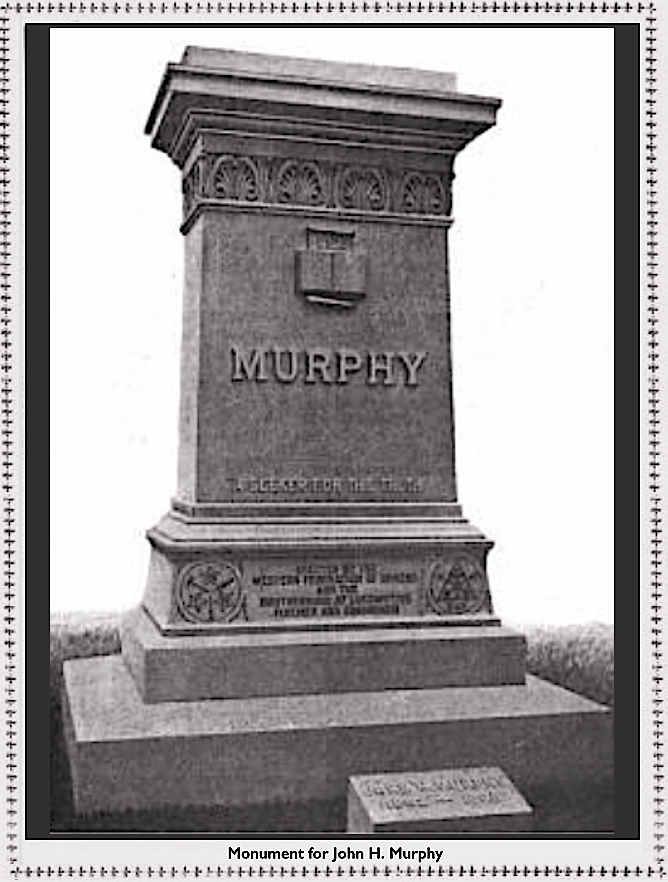 ———-
———-
Hellraisers Journal – Friday August 6, 1909
Denver, Colorado – Monuments for Murphy and Pettibone Dedicated, Part I
From The Miners Magazine of August 5, 1909:
Monument to Murphy and Pettibone Dedicated July 24th.
[Part I]
—–
—–On last Saturday afternoon the monuments erected to the memory of John H. Murphy and George A. Pettibone, were unveiled in the presence of more than 500 people who had gathered in Fairmont cemetery: The convention of the Western Federation of Miners adjourned at noon Saturday in order that the delegates might attend the dedication services in a body. At 2:15 p.m. the delegates left Denver in two special cars for the cemetery, followed by a special car containing members of the Brotherhood of Locomotive Firemen and Enginemen and another special car with members of the Granite Cutters’ Union. When the special cars reached the cemetery, the monuments were already surrounded by many of the friends of the departed and at 4 o’clock, Judge W. F. Hynes, who was master of ceremonies, addressed the gathering and paid eloquent tributes to the men who had proven their loyalty to the principles of organized labor. Judge Hynes then introduced A. H. Hawley, general secretary-treasurer of the Brotherhood of Locomotive Firemen and Enginemen, who spoke as follows:
Ladies and Gentlemen:
We have assembled here to pay a tribute; to honor and to show appreciation of the work done by two men whom it can be easily and truthfully said, that they died in the harness working for the cause of labor and humanity, and trying to make the homes of working men all that they should be.
Even though this be a sad hour to some, yet it affords me deep gratification as a representative of the Brotherhood of Locomotive Firemen and Enginemen to be permitted at this time to pay a tribute of respect to one who had been associated with our organization for over twenty years and who had been its chief legal adviser for over ten years.
If the sixty-five thousand members of the Brotherhood of Locomotive Firemen and Enginemen could at this time be conscious of what is transpiring at this moment at the last resting place of John Murphy, they would stand or sit with bowed heads as a mark of respect for the high esteem in which he was held by all who know him, or knew of him, and which he so richly merited.
Never before so far as I have been able to learn has two strong labor organizations joined hands to erect a monument that will stand for years to mark the resting place of one who passed through the trials that did John Murphy in trying to secure for them justice, and to guide them in the path of safety and right. In fact, I believe this this is the first time in history that two labor organizations have joined hands to honor in this manner one of their members.
As years roll on and the cause of labor progresses people will read the few lines engraved on this stone and say, labor does honor its departed friends.
No one knows what John Murphy suffered for the cause of labor.
It has always been the opinion of myself, and many I represent who were personally acquainted with him for years, that his early death was partly if not entirely caused by his too close attention to the interests of those he represented.
It is said by many that the time to show gratitude, the time to bring flowers and the time to say kind words is when a person is alive and can see the flowers. If they do not hear the kind words spoken they learn of their having been said. I believe if the one who now lies still and cold beneath this green grass could speak he would say as do the following lines:
When I’ve passed this world of sorrow,
Do not seek to sooth my brow,
Do not heap my grave with blossoms,–
Bring your sweetest roses now.
Bring them now while I am living,
Toiling on, in youths gay prime;
While I’m climbing life’s steep ladder,
‘Neath the heavy hand of time.Yet at the same time he was not one who wanted to be told of his good deeds. He sought not adulation,-he shunned flattery. But nature does the same for all of us. We like to have our efforts appreciated.
One thing that he always [sought-after?] was the truth. How many of his friends have heard the oft used expression: “I was only a seeker for truth!”
As we stand here today we recall his many acts and know when he expressed himself in this way it came from his heart.
No better illustration of his little desire for notoriety and his little desire for display can be shown than by his words to the men after the jury had declared them innocent of the crime of which they were accused. Lying in a hospital, on a bed of sickness when all expected that his time was drawing near and that soon the grim reaper would gather him in, John Murphy looked into the face of the large man at his bedside and said: “Bill, in this your hour of triumph, be humble.”
Great indeed would be the length of time necessary to tell of the many good deeds preformed by John Murphy. I will not attempt at this time to relate those of them that come to my mind. Many of them the press of the country have made public. Others are known only to his friends. Still others are known to his close associates who will tell of them later.
Did he have any faults, this is no time to speak of them. The faults of our friends we write upon the sand. Their virtues upon the tablets of love and memory. The virtues of he whom we loved to call friend and brother are emphasized by the erection of this beautiful monument.
He lived his short life of two score and six years and followed the teachings of the Golden Rule. He accepted the summons delivered by the messenger of death and passed beyond the summit of human apprehension. Let us hope that it is a wilderness of kindness, tenderness, love and affection; an unbounded forest of goodness, trimmed in purity, draped in virtue and sheltered in justice. He accepted censure and applause with indifference. He sympathized with the poor and weak. His life was such that if we cared to imitate him we could improve on our own.
We stop and reflect. We think of this and that. We wonder at results. When all is said and done we say time works wonders.
What a beautiful book is that of time. What a massive volume. No blank leaves are found. No preface contained within its covers. How we love to dwell on the first page. More silently than the zepher’s breath as it fans our brow does time turn his pages, and on all we find man pursuing the phantom happiness. But full oft he wanders over burning deserts; and over craggy rocks he toils, looking ever forward to some sunny spot where he sees the much sought for tree. He ever beholds the ripe clusters hanging low, waiting only for the grasping hand. He toils ever on to find its fruits like Sodom’s apples turning to ashes on his lips. Another page is noiselessly turned and we read of the joys of time, for joys they are, and well deserve the name. Mirrored there are the sunny days of childhood. Foundations of perennial spring are opened and full draughts of happiness quaffed. Yet we find no page telling all of joy, but here and there are seen fruits of the forbidden tree. No cup drawn from the well of earthly happiness is unmixed with gall. Yet none so mixed but that it might contain a little more. Still turning time’s pages we find them stamped with a thousand heart histories. Some telling of today rejoicing in the sun shine of prosperity; tomorrow struggling in the wars of adversity. Thus we find commingling hopes and fears, joys and sorrows, pleasure and pain. When all the pages have been perused, the book is rolled together and the angel of God will proclaim, Time is, but shall be no more.
Let us feel and know that he did his work as he saw it; always keeping in mind his duty to his fellow man. And let his dear ones feel, as is told in the words of the poet:
Once in our life the tide goes out
Leaving a desert of sand,
Sweeping our hopes and dreams away,
All that was joyful, grand.Tangle of sea-weed strewn about,
Far from the rocks where it grew;
Lifeless and drear, like the hope that died,
Moments of rapture we knew.Once in our life are priceless gems,
That vanish like pebbles and shells.
Leaving us bowed in grief and tears,
Tears we endeavored to quell.Leaving us alone with empty hands,
Seeking the treasures we missed.
Longing for friends gone long before;
Yearning for lips we have kissed.Once in our lives the tide goes out,
Yet, while we weep by the shore,
Foaming and singing the waves roll in,
Healing the heart that was sore.Filling our souls with pure joys,
Round us its treasures it hurls,
Till we behold through tearful eyes,
Millions of shimmering pearls.Let the words that are spoken here today be impressed upon the minds of the listeners. Let the facts that we have met to honor our friends be told to the world. Let it be carried to the business interests of the country that labor does appreciate what is done for them and that labor is always ready and willing to pay honor where honor is due. The little inscription on this monument will be read by many. As time rolls on and those who stand here today have passed to the great beyond others will come to take their places, but this stone will still remain to tell the newcomers of how two labor organizations paid tribute to their departed members.
Death makes all men equal. We bring nothing into this world, we take nothing away with us. Let us all remember the true words of the late Senator Ingals:
“When the fitful fever is over and the cruel wrangle of the market and forum have ceased, grass heals over the wound which our decent into this earth has made and the carpet of the infant becomes the blanket of the dead.”
[Emphasis added.]
~~~~~~~~~~~~~~~~~~~~~~
SOURCES
Quote AH Hawley re John H Murphy, Mnrs Mag p6, July 29, 1909
https://play.google.com/books/reader?id=hT8tAQAAMAAJ&printsec=frontcover&pg=GBS.PA91
The Miner’s Magazine
(Denver, Colorado)
-June 3, 1909-Jan 19, 1911
Western Federation of Miners, 1909
https://books.google.com/books?id=hT8tAQAAMAAJ
-July 29, 1909: cxxxv (135)
https://play.google.com/books/reader?id=hT8tAQAAMAAJ&printsec=frontcover&pg=GBS.PA86
“Monument to Murphy and Pettibone Dedicated July 24th”
https://play.google.com/books/reader?id=hT8tAQAAMAAJ&printsec=frontcover&pg=GBS.PA90
-Aug 5, 1909: cli (151)
https://play.google.com/books/reader?id=hT8tAQAAMAAJ&printsec=frontcover&pg=GBS.PA102
“Monument to Murphy and Pettibone Dedicated July 24”
https://play.google.com/books/reader?id=hT8tAQAAMAAJ&printsec=frontcover&pg=GBS.PA105
IMAGES
John Murphy, Pettibone, Mnrs Mag p4, Aug 5, p6, July 29, 1909
https://play.google.com/books/reader?id=hT8tAQAAMAAJ&printsec=frontcover&pg=GBS.PA105
https://play.google.com/books/reader?id=hT8tAQAAMAAJ&printsec=frontcover&pg=GBS.PA91
WFM, Murphy Monument, Mnrs Mag p5, Aug 5, Firemens Mag p433, Sept 1909
https://play.google.com/books/reader?id=hT8tAQAAMAAJ&printsec=frontcover&pg=GBS.PA106
https://play.google.com/books/reader?id=oXMWAAAAYAAJ&hl=en&pg=GBS.PA433
See also:
From Locomotive Firemen’s Magazine of Sept 1909:
“Murphy and Pettibone Monuments Dedicated”
https://play.google.com/books/reader?id=oXMWAAAAYAAJ&hl=en&pg=GBS.PA429
Spokane Press, March 4, 1908, re death of Murphy on March 3, 1908
https://chroniclingamerica.loc.gov/lccn/sn88085947/1908-03-04/ed-1/seq-1/
From Darrow Collection:
John H Murphy, 1862-1908
http://moses.law.umn.edu/darrow/photo.php?pid=1332
Tag: John H Murphy
https://weneverforget.org/tag/john-h-murphy/
~~~~~~~~~~~~~~~~~~~~~~~~~~~~~~~~~~~~~~~~~~~~~
Working Class Hero – John Lennon


